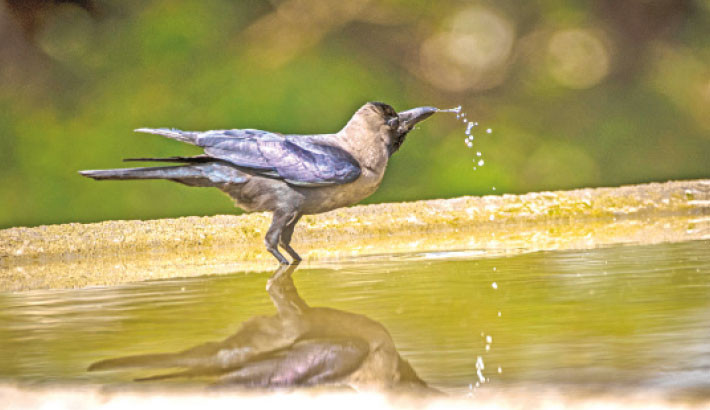Harsh bout of heat continues disrupting normal life
The very severe heat wave continues making lives miserable in Dhaka and elsewhere in the country
Published: 22 Apr 2024, 11:53 AM

A crow drinks water from a reservoir to quench its thirst amid the ongoing heat wave. The blazing heat wave sweeping over most parts of the country has not only made life difficult for human beings but also for birds and animals. MONIRUL ISLAM MARUF
Three more people have died from heatstroke as the extreme heat wave continues to disrupt normal life across the country with farmers worrying about their crops and seasonal fruits, and children and elderly falling sick.
With this, five people died from heatstroke in the past two days, reports UNB.
In Meherpur, a 45-year-old housewife, Shilpi Khatun, apparently died from heatstroke in Gangni upazila on Sunday morning while in Narsingdi, a young man named Shafqat Jameel Iban in the afternoon and a rickshaw puller in Sylhet’s Dakshin Surma upazila at noon.
Schools and colleges have already been shut, considering the health and safety of the students, while some universities have resorted to online platforms to keep their academic activities operational.
A rigorous heat wave has been sweeping over the country since the first week of April. Although the 72-hour nationwide heat alert issued by the Bangladesh Meteorological Department (BMD) expires today, its forecast says the country will continue to sizzle in extreme heat in the next few days.
A very severe heat wave was sweeping over the districts of Pabna and Chuadanga, while a severe heat wave was sweeping over Rajshahi, Tangail, Jashore and Kushtia on Sunday, according to the BMD.
Besides, a mild to moderate heat wave was sweeping over the districts under the divisions of Rangpur, Barishal and Mymensingh and the rest parts of Dhaka, Rajshahi and Khulna divisions and the district of Chandpur and it is likely to continue, Met office says.
If the temperature surpasses 42 degrees Celsius, it is considered a very severe heat wave, while the mercury between 40°C-41.9°C is considered a severe heat wave, the limit between 38°C-39.9°C is considered a moderate heat wave, and the range between 36°C-37.9°C is considered a mild heat wave, according to the BMD.
The very severe heat wave continues making lives miserable in Dhaka and elsewhere in the country, forcing people to stay indoors during the daytime.
Public health experts are suggesting people avoid sunny places and use sunglasses, umbrellas and caps while going out during the daytime.
The temperature in the capital fell to 38.2 degrees Celsius on Sunday which reached 40.4 degrees Celsius a day ago.
The country’s highest temperature was recorded at 42.2 degrees Celsius on Sunday in Chuadanga, while the highest temperature was recorded at 42.6 degrees Celsius on Saturday in Jashore, said Shaheenul Islam, a meteorologist at the BMD.
Due to an increase in humidity, the discomfort may persist, he said.
The government has already closed all the public and private schools – both primary and secondary – and colleges and madrasahs until 27 April, which were supposed to reopen Sunday after holidays for Eid-ul-Fitr and Pahela Baishakh.
Amid scorching heat, the Dhaka University (DU) authorities on Sunday decided to hold all the classroom activities online for an indefinite period.
Jagannath University also followed the DU, saying the university’s all classes will be held online this week. It has also rescheduled all examinations for next time.
Also, Islamic Arabic University has instructed all affiliated Fazil and Kamil madrasahs of the country to close their classes and start online classes to avoid the health risks of students due to the intense heat wave.
Hospitals kept ready
Meanwhile, Health and Family Welfare Minister Dr Samanta Lal Sen on Sunday ordered the authorities concerned to keep enough beds vacant in hospitals across the country amid the ongoing heat wave.
He made the directives after a meeting with the directors of hospitals and civil surgeons across the country.
Farmers’ worries linger
The extreme heat wave over the last two weeks has been affecting crops, seasonal fruits, livestock and fish farming across the country.
Farmers are now in trouble as the prevailing drought-like condition is causing damage to standing crops. Besides, they also need to provide extra irrigation to their croplands to save the crops, pushing up the production cost.
Dr Mohan Kumar Das, executive director of the National Oceanographic And Maritime Institute (NOAMI) and joint secretary of the South Asian Meteorological Association (SAMA), told the Daily Sun that heat waves can cause various diseases and disorders in plants, including heat stress, increased pest and disease pressure, water stress, sunburn, blossom drop, fruit disorders, reduced nutrient uptake, and delayed growth.
Health risks on rise
A prolonged exposure to high temperatures can lead to heat-related illnesses like heat exhaustion and heatstroke, causing dehydration and organ damage, according to public health experts.
Disrupted water and sanitation systems during heat waves heighten the risk of waterborne diseases like diarrhoea and cholera, while elevated temperatures accelerate food spoilage and bacterial growth, causing foodborne illnesses, said Dr Mohan Kumar.
Besides, poor air quality worsened by heat waves exacerbates respiratory conditions, creating diseases like asthma and chronic obstructive pulmonary disease, and increasing the risk of respiratory infections.
Besides, the elderly, children, and those with pre-existing chronic diseases are more susceptible to heat-related risks due to limited access to cooling facilities and healthcare services amid the scorching hot weather.

